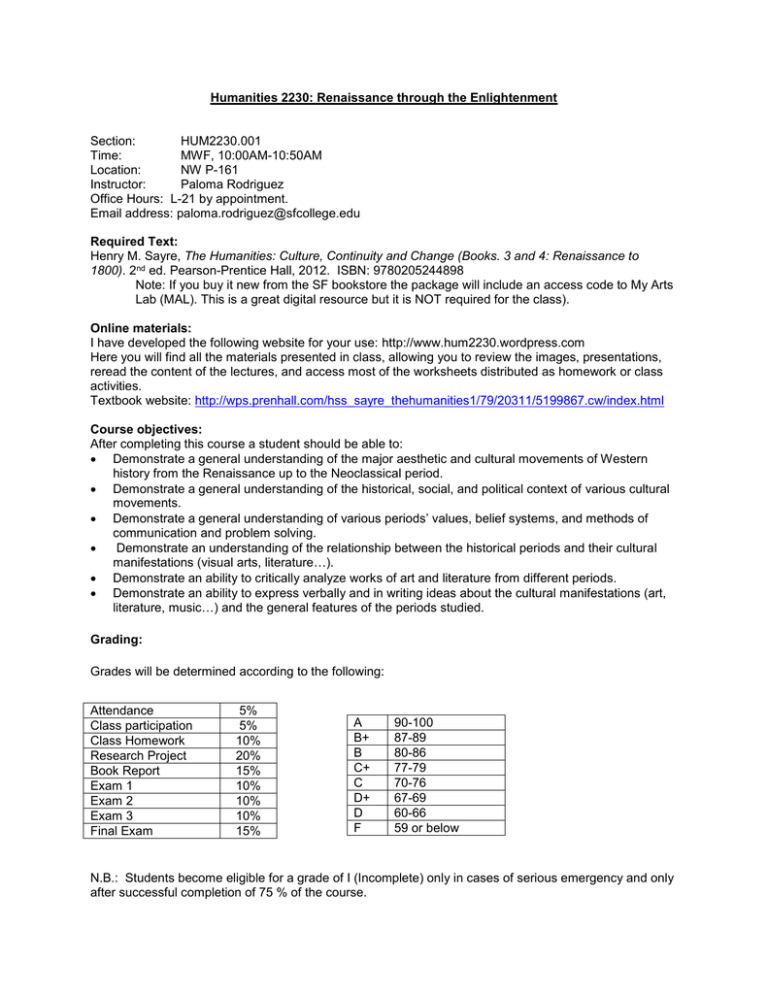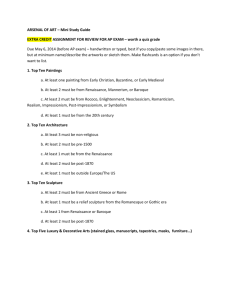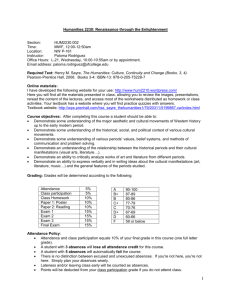
Humanities 2230: Renaissance through the Enlightenment
Section:
HUM2230.001
Time:
MWF, 10:00AM-10:50AM
Location:
NW P-161
Instructor:
Paloma Rodriguez
Office Hours: L-21 by appointment.
Email address: paloma.rodriguez@sfcollege.edu
Required Text:
Henry M. Sayre, The Humanities: Culture, Continuity and Change (Books. 3 and 4: Renaissance to
1800). 2nd ed. Pearson-Prentice Hall, 2012. ISBN: 9780205244898
Note: If you buy it new from the SF bookstore the package will include an access code to My Arts
Lab (MAL). This is a great digital resource but it is NOT required for the class).
Online materials:
I have developed the following website for your use: http://www.hum2230.wordpress.com
Here you will find all the materials presented in class, allowing you to review the images, presentations,
reread the content of the lectures, and access most of the worksheets distributed as homework or class
activities.
Textbook website: http://wps.prenhall.com/hss_sayre_thehumanities1/79/20311/5199867.cw/index.html
Course objectives:
After completing this course a student should be able to:
Demonstrate a general understanding of the major aesthetic and cultural movements of Western
history from the Renaissance up to the Neoclassical period.
Demonstrate a general understanding of the historical, social, and political context of various cultural
movements.
Demonstrate a general understanding of various periods’ values, belief systems, and methods of
communication and problem solving.
Demonstrate an understanding of the relationship between the historical periods and their cultural
manifestations (visual arts, literature…).
Demonstrate an ability to critically analyze works of art and literature from different periods.
Demonstrate an ability to express verbally and in writing ideas about the cultural manifestations (art,
literature, music…) and the general features of the periods studied.
Grading:
Grades will be determined according to the following:
Attendance
Class participation
Class Homework
Research Project
Book Report
Exam 1
Exam 2
Exam 3
Final Exam
5%
5%
10%
20%
15%
10%
10%
10%
15%
A
B+
B
C+
C
D+
D
F
90-100
87-89
80-86
77-79
70-76
67-69
60-66
59 or below
N.B.: Students become eligible for a grade of I (Incomplete) only in cases of serious emergency and only
after successful completion of 75 % of the course.
Attendance Policy:
Attendance and class participation equals 10% of your final grade in this course (one full letter
grade).
A student with 3 absences will lose all attendance credit for this course.
A student with 5 absences will automatically fail the course.
There is no distinction between excused and unexcused absences. If you're not here, you're not
here. Simply plan your absences wisely.
Lateness and/or leaving class early will be counted as absences.
Points will be deducted from your class participation grade if you do not attend class.
I expect that all students will be prepared for and attend every class. These are some of the reasons why
you should attend every class:
-Classroom attendance will facilitate your learning enormously by helping you summarize and
process the information from the textbook. Actually you will be saving in study time by coming to
class!
-Lessons will supplement and enrich the course content through films, presentations, and
discussions. This information cannot always be found in your textbook or online. If you miss class you
will be missing an important part of the coursework, and your performance in exams is likely to suffer
because of it.
Class participation:
While in class you are expected to interact with peers and participate in discussions. This class will
demand your involvement. It will not consist of lectures alone. You will be asked to participate in class
activities which will be performed sometimes individually and sometimes in groups.
Warning: You will lose part or all class participation points:
- If you are reluctant to participate in class discussions and/ or to work in groups or with a partner.
- If you are not prepared for class (if you have not completed your homework, you have not read
the assigned texts, etc.)
- If you are disruptive, for instance by interrupting the lectures by talking to someone else.
-If you are distracted from class in any way.
-If you use your phone at all during class (to talk, text, or browse the internet)
-If you use a laptop for purposes other than taking notes.
Students engaging in disrupting behavior will be dismissed from class for the day and will be counted
absent.
Look at these policies from the bright side. By coming to class every day, bringing your
homework, and participating in class activities you will be given 20 points towards your final
grade! On top of that you will be actually reducing the amount of study you would have to do
on your own if you didn’t attend class.
Homework
a) Daily Class Assignments: There are 3 types of class homework assignments:
1. Textbook worksheets to be completed by reading each chapter of your textbook. The worksheets will
help you assimilate the most important information in each chapter.
2. Extra readings: Handouts with texts and related questions that are not in your textbook. They will
complement the content of the course.
3. Writing practice: Handouts with exercises that will require that you write a short essay. This will give
you the chance to practice your academic writing, a fundamental skill in this course.
4. Documentary/ Movie viewings: : I will ask you to watch specific movies and/or as homework. You will
have to write short reports or answer questions about them. I will also ask you to attend lectures and
exhibits at the WHE as homework assignments.
I will collect homework daily. I expect you to show a reasonable recollection and understanding of the
concepts discussed in the handouts and readings when you come to class. If you fail to show such
understanding and/or you do not bring your completed homework to class, points will be
deducted from your homework AND class participation grades. Should there be any pop-quizzes,
your grades in them will be part of your homework grade.
b) Papers/ Projects: In addition to the three examinations and the final exam, you will also have to
complete a research project and an essay paper.
1. Research Project: For this assignment you will have to create a research poster about a
subject related to class material. You will have to choose a topic, read about it in scholarly
sources and produce a poster that is informative, concise, well structured, and properly written.
2. Book Report: This assignment will require that you read a work of literature related to class
material. You will have to choose one work from a list of historical novels and primary sources
and write a 600 word long report about it showing your ability to connect the information learned
in class with your reading. I will monitor the progress of your reading throughout the course by
including questions about it in exams and quizzes.
Specific guidelines for each of these assignments will be provided during the course.
N.B.: This is a writing intensive course. Satisfactory completion of these writing assignments is a
prerequisite to successful completion of this course.
World Humanities Expo (WHE)
The Humanities and Foreign Languages Department will be hosting the World Humanities Expo (WHE)
the week of November 13-15th. The event will feature interesting lectures and performances as well as
displaying the best examples of students work (posters, creative projects, etc) in the disciplines of
Speech, Philosophy, Humanities, Religion, and Foreign Languages. Attendance to this event is
mandatory and it will count towards your grade in the class.
Make-up Policy and Late Work: Make-ups and extension will only be given in extreme circumstances
(hospitalizations, death in the family…). Documentation will be required. If you turn in your project, papers
or homework late you will only receive partial credit for it. One letter grade will be deducted from the
grade you earn for every day the assignment is overdue.
Academic Honesty Policy: Academic dishonesty is not accepted in any class at Santa Fe Community
College, and I will vigorously pursue and prosecute any instances of such dishonesty. One extremely
serious offense you must avoid is plagiarism, or using the research, ideas or words of others as your own
without giving proper credit to your source. I will not tolerate plagiarism or cheating of any sort. Students
who cheat or plagiarize written material in any way will receive an automatic zero on the assignment and
will fail the course. This policy especially includes copying or paraphrasing written materials from gallery
brochures, play programs, books, periodicals, encyclopedias, CD-ROMs, the Internet, or someone else’s
paper. By the act of submitting written work or an examination, the student signifies that he or she
understands the definition of academic dishonesty and is willing to accept the consequences for any
violation.
Examinations: There will be three unit exams. They will include short questions (true-false, multiple
choice …), and essay questions. Make-up exams will NOT be given unless truly extraordinary
circumstances arise. Adequate documentation will be required. No final exam will be given early.
Final Exam Date: 12/10/2012 Time: 10:30 AM to 12:30 AM Campus: NW Bldg/Room: P-261
Schedule: We will advance at a pace of approximately one chapter per week in the following order:
Introduction to the Renaissance.
Chapter 14: Florence and the Early Renaissance
Chapter 15: The High Renaissance in Rome and Venice
Exam 1 (approx week 5: September 20)
Chapter 16: The Renaissance in the North
Chapter 17: The Reformation
Chapter 18: Impact and Confrontation
Chapter 19: England in the Tudor Age
Chapter 20: Early Counter-Reformation and Mannerism
Exam 2 (approx week 8: October 10-14)
Chapter 21: The Baroque in Italy
Chapter 22: The Secular Baroque in the North
Chapter 23: The Baroque Court
Chapter 24: The Rise of the Enlightenment in England
Exam 3 (approx week 12: November 7-11)
Chapter 25: The Rococo and the Enlightenment in the Continent.
Chapter 26: Rights of Men: Revolution and the Neoclassical Style
Final Exam: December 10th
Important dates
September
3
7
14
28
October
5
10
19
29
November
5-7
9
12
13-15
23
28
December
10
Labor Day. No class
Book in hand
Topic of research poster due
Topic statement and annotated bibliography for
research poster due
Book Quiz on 50% of book
Rough draft of research poster due
Study Trip to the Ringling Museum.
Poster Final Draft (digital)
Poster session in class (posters printed)
UF Homecoming. No class
Veterans Day. No class.
World Humanities Expo
Thanksgiving Holiday. No class
Book Report due
Final Exam





